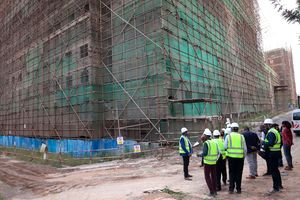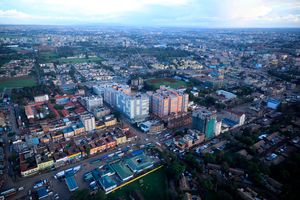
Gavel
President William Ruto’s affordable housing initiative continues to face headwinds after the High Court stopped the national government and Kiambu County from continuing with the project on a private piece of land belonging to a city lawyer.
Lawyer Njoroge Regeru obtained an injunction stopping the construction of affordable houses in Kikuyu town on grounds that he owns the land earmarked for the project.
Lawyer Njoroge Regeru obtained an injunction stopping the construction of affordable houses on his land known as Muguga/Gitaru/1042 in Kikuyu town, measuring 0.0330 hectares (about one-eighth of an acre). The construction of the houses is continuing on other parcels belonging to various individuals, but which are not part of the court case.
Justice Jane Muyoti Onyango put on hold the plans by the Ministry of Lands and Housing in conjunction with the Kiambu County government to build the houses on Mr Regeru’s portion of the land, pending the determination of the dispute.
The court noted that Mr Regeru was likely to suffer irreparable loss if the project proceeded on his land since the Kiambu government had invaded the parcel, started excavations and dug trenches.
“This court finds that the actions by the respondents would lead to the applicant (Mr Regeru) suffering irreparable loss if the injunctive relief is not granted,” said the judge.
Justice Onyango added that the lawyer had demonstrated that he had been inconvenienced by the government’s unlawful activities on his land and the balance of convenience, therefore, tilted in his favour.
“In the final analysis, I am of the view that Mr Regeru has satisfied the conditions for the grant of a temporary injunction,” said justice Onyango.
President William Ruto launched the affordable housing project as a way of ensuring equitable access to decent affordable housing, in accordance with Article 43 of the Constitution.
According to the President, the affordable housing initiative was designed to meet the critical housing needs of individual Kenyans, ensuring that resources are directed towards those who need them the most.
Dr Ruto also said the project was meant to create jobs for Kenyan youths including architecture, engineering, urban planning, masonry, carpentry and electric work.
The President had promised to deliver 200,000 affordable houses every year but the promise has not been fulfilled.
Mr Regeru moved to court last year seeking temporary injunction to restrain the government from fencing, excavating, constructing or interfering with the land, known as Muguga/Gitaru/1042.
He submitted that sometime in 2016, the Kiambu county government entered the property and fenced it, prompting him to move to court.
Mr Regeru added that thereafter, the National Land Commission (NLC) purported to cancel his title to the property through Gazette Notice No.6862 dated July 17, 2017. He amended his case and joined the NLC in the matter.
Consequently, the Environment and Land Court, later ordered the cancellation of the gazette notice and issued a declaration that the land belonged to the lawyer.
Mr Regeru said he later discovered that the devolved unit had entered the property and started excavating the soil and digging trenches in readiness for the construction of affordable houses.
The lawyer said he wrote a demand letter to the county government, which was ignored, prompting him to move to court.
Kiambu County opposed the case and in an affidavit by Ms Waithira Waiyaki, an adviser at the office of the county attorney, argued that two cases relating to the property were still pending in court.
Mr Regeru said a review by the county government, which confirmed that he is the legitimate owner of the land, was dismissed.
To support his case, Mr Regeru presented a copy of the judgment and the decree issued by the court against the county government.
In her ruling, the judge said there was no evidence to show that the court order, obtained by Mr Regeru, had been set aside.
The Kiambu county government insisted that there was an application for review of the said judgment pending before a Nairobi court.
However, Mr Regeru produced the ruling dated August 9, 2024, through which the court dismissed the said application.
Justice Onyango noted that the county government was in violation of the decree of the court.
“On the whole, the material placed before the court, I am persuaded that Mr Regeru has established a prima facie case with a probability of success,” ruled the judge.









